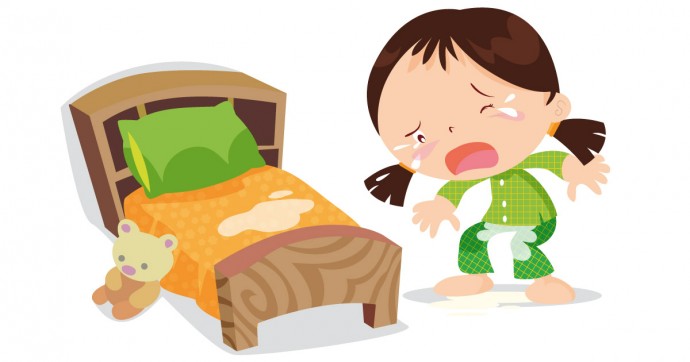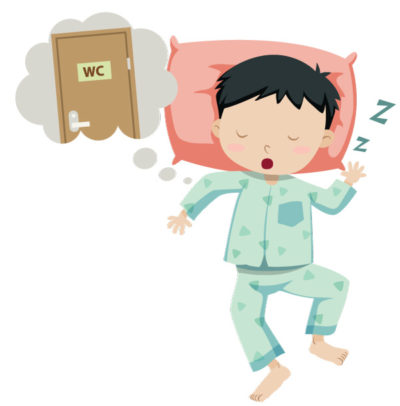If your child wets his bed after he has been toilet-trained (usually ≥ 5 years of age), take it in your stride. Enuresis, or more commonly referred to as bedwetting, is a condition where your child is unable to control his bladder when sleeping, leading to involuntary urination.
Children who suffer from nocturnal enuresis may have less control of their bladders than they would like, leading to ‘accidents’ where they wet their bed at night. It is important to note that you should NOT punish or cause him embarrassment for bedwetting. It is something that is out of his control at this point, and he is probably even more embarrassed or ashamed of it than you might imagine.
How common is enuresis?
Age 5-10 years – 5-10%
Age 11-14 years – 2-3%
Age ≥ 15 years – 1-2%
(i.e. 1 in 100 in the population may persist till adulthood)
What causes it?
The exact cause of nocturnal enuresis is unknown. However, there are several possible reasons.
- Hormones: The body produces an antidiuretic hormone (ADH) that causes it to produce less urine when asleep. A lack of ADH may lead to more urine being produced when asleep.
- Bladder: Muscle spasms may prevent the bladder from holding more urine. Some people may also have a smaller than normal bladder.
- Genetics/Familial: Older children who suffer from enuresis often have at least one parent who also had this problem, and at a similar age.
- Deep sleep: Your child might be asleep so deeply that he is unable to wake up to pee.
- Diuretics: Certain chemicals (e.g. caffeine, carbonated drinks) can cause more frequent urination.
- Medical conditions: Certain medical conditions can trigger secondary enuresis. These include diabetes, urinary tract abnormalities (born with abnormal urinary tract structure), constipation, and urinary tract infections (UTIs). Spinal cord trauma, such as severe stretching of the spinal cord resulting from a fall, sports injury or auto accident may also play a role in enuresis, although this is rare.
- Stress: Traumatic events such as parents divorcing, death (friend or family member), moving to a new city, changing school, or any sudden changes can cause stress in children. This may cause enuresis.
Managing the problem
Consult your child’s paediatrician to learn more about nocturnal enuresis to exclude the possibility of a medical problem. This will involve a physical examination and his medical history. The physical examination may include a urine analysis to test for signs of disease.
As nocturnal enuresis is not necessarily caused by disease, don’t worry if the test results are ‘normal’. His paediatrician may also need to ask for seemingly unrelated information, such as sleeping habits or patterns, bowel movement, and urinary signs or symptoms (e.g. frequent urge to pee, or pain/burning sensation during urination).
This phase may take some time and your child will likely continue to wet his bed. In the meantime, you can try:
- Using a waterproof cover: Line the bed with a waterproof liner to keep his bed dry.
- Providing easy access to the toilet: Position his bed as close to the toilet as possible. If he sleeps in a bunk bed, let him use the bottom bunk.
- No babying allowed: Do not wake him to go to toilet, as this is counterproductive in the long term. Older children may also want to change their clothes/bedsheets at night, so do provide them with spares.
- No drinks before bedtime & early dinner time: This helps to minimise the amount of fluids in his body and thus, hopefully prevent an overly full bladder. This will reduce the chances of wetting the bed or minimise the amount. However, take care to provide him with plenty of water during the day to prevent dehydration.
- Foods/drinks to avoid: In general, avoid coffee, tea, chocolate, and sodas or other carbonated beverages with caffeine. Caffeine is a diuretic, meaning that it causes the urge to urinate.
Bedwetting alarm
This little gadget consists of a sensor and an alarm, which will wake your child up if he wets his bed. The idea behind this is to ‘train’ him to wake up by himself and over time, he will hopefully wake up before he wets his bed.
The key is to wake up quickly before the bed is too wet. The sooner he can wake up, the more effective it will be in modifying his bedwetting behaviour. However, do be patient as this will take at least a month before you can see whether there will be any improvement. Unfortunately, this method may not be suitable if he shares a room with others (e.g. with siblings or parents).
Take it in your stride
In addition to giving you some pointer’s on how to cope, your child’s paediatrician may even prescribe medication for it. However, no medicine has been proven effective in permanently ‘curing’ bedwetting, and bedwetting may resume when the medication is stopped. Full commitment from parents/caretaker is crucial in managing enuresis, and not just relying on medication alone.
Rest assured that, yes, there is good news – bedwetting will often ‘clear up’ by itself. If you feel overwhelmed, follow up with his paediatrician and he may have more suggestions that may help you. Alternatively, you could even check with your own parents to see whether you went through a similar episode yourself, and if so, how they handled it.
An educational contribution by Malaysian Paediatric Association.








Comments